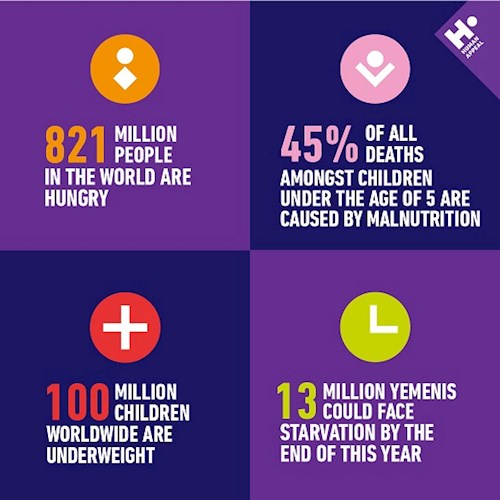Your Final 10 Nights for Gaza – Automate your charity in the blessed last 10 nights of Ramadan.
Schedule your donationsYour Final 10 Nights for Gaza – Automate your charity in the blessed last 10 nights of Ramadan.
Schedule your donationsYour Final 10 Nights for Gaza – Automate your charity in the blessed last 10 nights of Ramadan.
Schedule your donationsYour Final 10 Nights for Gaza – Automate your charity in the blessed last 10 nights of Ramadan.
Schedule your donations16th October 2018
This year, World Food Day is being recognised across the world with one simple message – humanity wants zero hunger.

The world has made unbelievable progress in in the last 30 years – the number of hungry people has fallen by about 200 million, all whilst the population has grown by a staggering 2.3 billion. Humanity can do amazing things. However, in 2018, hunger is still a chronic and devastating issue. In the last couple of years, the number of hungry people is actually rising. At least 821 million people go to bed hungry every night and 3.1 million children under 5 die every year due to starvation and malnourishment. We still have an awful long way to go to reach #ZeroHunger by 2030.
Devastatingly, these millions of people are suffering whilst 30-40% of the world’s food production is lost or wasted, with the vast majority of wastage occurring in developed countries like the UK and USA. Hunger highlights the crippling inequality that exists in our world today.
For a hungry person, it isn’t as simple as finding a job and buying food for their family. It’s a vicious cycle that’s hugely difficult to break free from without the right support system and global changes to the food production system. In developing countries, support systems to tackle hunger are scarce and sometimes non-existent. The situation is worsening in South America and Africa.
Hunger impacts all aspects of human life. It causes stunting in 1 in 4 children. This has a devastating impact on the health and development of their organs, muscles and – vitally – brains. It poses serious challenges to their learning capabilities at school.
For some children, going to school isn’t even an option. Children as young as five will be forced to seek out work, enduring extremely dangerous working conditions and gruellingly long hours just to ensure their families can eat. Education is a huge emancipator of poverty and food hunger – so when a child misses out on their education, they miss out on lifting themselves out of poverty and hunger.
Often undertaken as a result of mass-production pressures from developed countries, poor harvesting practices cause resource wastage, as well as damaged, overworked and under-nourished lands. The industry contributes massively to climate change, causing longer droughts and more catastrophic storms, wreaking havoc on the quality of harvests.
Countries that are already blighted by high levels of poverty and malnutrition are particularly vulnerable to the heightened natural disasters that climate change causes. The World Food Programme predicts that hunger and malnutrition will increase by 20% by 2050, unless steps are taken to help countries adapt to the effects of climate change.
A shocking 1 in 3 people across the globe suffer from some form of malnutrition. Malnutrition is caused by eating a diet that doesn’t contain the adequate number of nutrients. People can become both under and over-nourished by taking either not enough food, too much food or too much of the wrong types of food.
Good nutrition is essential. Every person needs to be properly nourished in order to live a healthy, productive and fulfilling life. It has a massive impact upon educational attainment and the strength of a country’s economy. Malnutrition weakens the immune system, increases the risk of contracting diseases and eventually results in death.
According to the World Food Programme, more children die each year as a result of undernutrition than malaria, AIDS and tuberculosis all put together. 45% of all deaths among children under 5 are caused by malnutrition.
Eradicating global hunger is goal number 2 on the UN’s list of Sustainable Development Goals. It is vital we all do our bit to help reach this target to secure a world that we can all be proud of. Human Appeal has been tackling world hunger since 1991. Providing both emergency food support and long term sustainable development solutions are a priority for our organisation. We have a strong presence in some of the most affected countries across Africa, Asia and the Middle East.
This year alone, we have built and supported food security related projects in Bangladesh, Iraq, Jordan, Kenya, Lebanon, Myanmar, Niger, Palestine, Somalia, Syria, and Yemen. This has helped improved food security for 368,645 people this year. But we cannot tackle world hunger on our own – we need your help.
Donate to Our Food Aid Projects
We can only continue this vital work with your support. Just £100 will buy food, clean water and basic medical care for a family in Syria, Yemen or Gaza. Without you, they may go to bed hungry again tonight. Just £65 will provide a family of five in Yemen who are facing starvation with enough food for a whole month. Without you, they may not survive.
Thank you for joining the fight to end hunger!